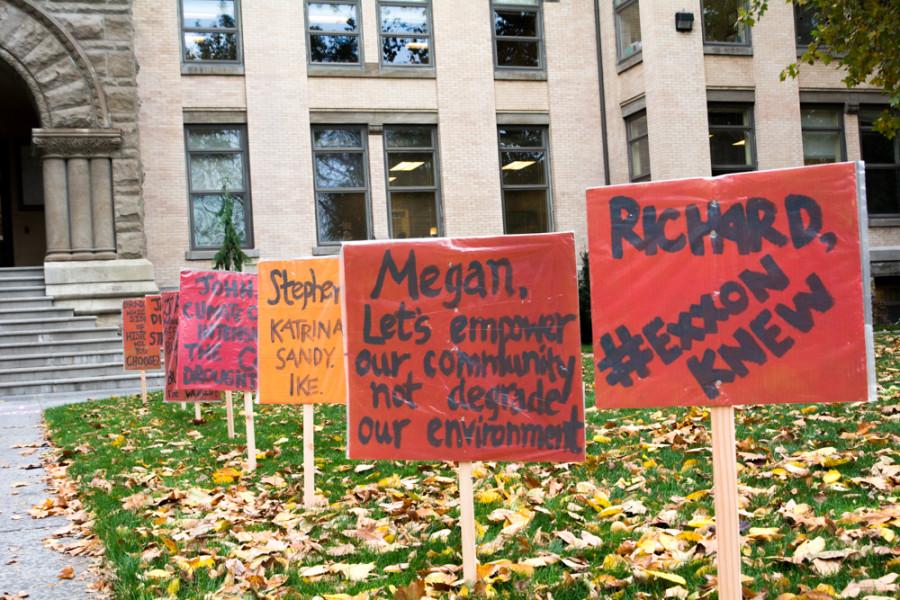
The tense, drawn-out government shutdown has entered into its 10th day, the Oct. 17 deadline to raise the debt ceiling looms ever closer and tensions have only increased between President Obama and the GOP. American citizens have been relegated to useless bystanders, turning the entire crisis into a frustrating and potentially disastrous spectacle.
Although Whitman College continues to function relatively smoothly, individuals at the college have been affected in a variety of underlying ways. From research that has been brought to a grinding halt, to students whose tuition payments rely on the salary of a federally paid parent, the impact of the shutdown is undeniable and demands attention.
Associate Professor of Geology Kirsten Nicolaysen has encountered multiple hindrances in her work, including her and her students’ inability to complete research before a fast approaching conference, where they will be presenting their findings. Nicolaysen has a student who is finishing up an Abshire Award project looking into explosive eruptions in the Aleutian Islands, but because the student’s data is obtained through a government database, the project is at a standstill.
“We’re accessing [data] through a government database. And that database is down. So we have a conference presentation related to this project in October and one in December, and we’d really like to have access to that database,” said Nicolaysen.
Many senior students writing their theses also require access to government databases, and have reached a similar impasse due to the shutdown of federal agencies. Assistant Professor of Biology Tim Parker is currently advising two students who, as a part of their thesis research, spent their summers at federal agencies. At this point in time, these students would be expected to obtain the remaining parts of their data and be conducting statistical analyses on these datasets. However, they have no access to portions of their data that are still held with the government agencies.
“These two students only have part of the data from their summer and they’re just waiting for folks at different federal agencies,” said Parker.
In this case, as in many others, the result of the shutdown is not the end of the world. Assuming the government resumes action within the next couple weeks, the end result will be restructured deadlines and more intensive work in the future.
“The fact that they’re not doing their statistical analyses right now slows them down, but it’s not some insurmountable hurdle in the time scales we’re talking about so far,” said Parker.
For the others, however, including Whitman’s Outdoor Program (the OP), they must actively work around the obstacles presented by the shutdown to continue to function properly.
According to the Assistant Director of the OP Stuart Chapin, between the Bureau of Land Management, the Forest Service, the National Park System and the U.S. Fish and Game Service, around 80 or 90 percent of the OP’s weekend trips operate on federal land.
The biggest challenge to the OP is that these federal lands are not all explicitly closed; there is uncertainty surrounding the status of each one, and due to federal workers being furloughed, there is no way to discover which ones are operational and what services they provide.
“I think the biggest problem is not that federal land is closed; it’s that a lot of federal agencies aren’t explicitly stating what we can do on their land,” said the OP’s Trips Coordinator senior Madelyn Player.
Chapin added that the distinction between what “closed” implies can be ambiguous. Some land is designated as closed, but that may be only in reference to facilities provided. So visitors can legally be on that federal land, but necessities such as water or bathrooms might be unavailable.
“So trying to figure out which is which [is difficult]. National parks are closed; you can’t be there. National forests, however, appear to be ‘not open,’ which is not the same in that the bathrooms are locked and you’re not going to see a ranger, but you are allowed to be out there alone,” said Chapin.
As for the future, the government shutdown can possibly affect where first-year Scrambles are able to take place at the beginning of next year. Every 10 or 15 years, Wallowa-Whitman National Forest undergoes a “Needs Assessment,” where they determine which commercial groups can operate in the forest. Because the OP used a temporary permit last year that cannot be renewed, they need to apply for a “Priority Use Permit” for the upcoming year, which will give them access for the next 10 years. According to Chapin, however, the application is currently halted, and even once it resumes, it will take months to complete. The OP needs to know whether or not they have secured the permit before the Scrambles are finalized and the information packets are sent out in mid-April. Considering that eight out of 20 first-year Scrambles are run in the Wallowas, the government shutdown has the potential to alter the types of trips offered next year.
“Every week that the government is shutdown is pushing us closer and closer to not being able to run our Scrambles in the Wallowas,” said Chapin.
The government shutdown threatens to impact students financially as well, and in some cases, their ability to afford tuition. Sophomore Caitlin Griffin’s mother is the Head Contractor for Mt. Rainier National Parks, a position which has been deemed not required by the federal government, and so she has been furloughed. Griffin relies upon her mother’s salary to pay for and plan for tuition costs.
“Without the government’s funding, of course, our income is significantly hindered, which is a problem,” said Griffin. “Until [the government resumes], it is a bit of a weigh on my mind the longer it goes on. Even if it doesn’t affect me now, it will in the long run, which is bad.”
The impact of the government shutdown has further proven to also financially affect international students at Whitman. International students’ financial aid is contingent upon how much money they can contribute to their education. Consequently, many of the international students at Whitman work on campus, but are only allowed to do so with a permanent social security card, which are obtained in students’ first year at Whitman.
This process, however, has recently been complicated by the fact that the social security office is not taking any new applications during the government shutdown.
“[For the first-year international students,] we have eight applications out of 21 completed, and they are not taking new applications anymore,” said Kris Barry, international student and scholar advisor.
First-year international students who have already begun work and have not yet applied for a social security number will not be paid immediately for their work and risk further complications the longer they can’t complete their application.
“We really need to have these in place because some of them have started employment, and they need to be processed. It would be tragic if we didn’t get them down by the end of the year. That would be really awful,” said Barry.
These issues, while not largely impactful on an institutional level, are nonetheless incredibly problematic to each of the individuals affected. With the shutdown entering into its 10th day, these complications will only increase as the government remains inactive. In the end, all of these effects will hopefully prove to be short term in regards to Whitman’s future. Until then, however, the impact is felt in many different corners of the community.
















Collin Smith • Oct 10, 2013 at 4:12 pm
This is a great article that helps bring the shutdown closer to home though I disagree with being labeled a “useless bystander” during this crisis. I have already sent a letter to my congressman expressing my displeasure with the shutdown and the fight over the debt ceiling. I would encourage everyone else who feels affected to do the same.